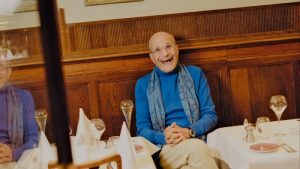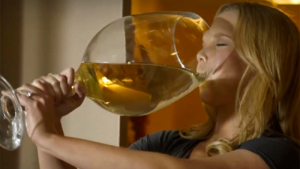How the trio behind The Hero plan to save the British pub…
There are a couple of stories you could tell about the state of the British pub. One is pretty dire. According to official statistics, about 80 pubs a month have closed this year due to increased costs, high taxes and reduced customer spending. This marks a 56 per cent increase in closures year on year. At the same time, a new generation of pub has emerged that is not just surviving but thriving. Top among them: The Pelican in Notting Hill (which launched in 2021), The Bull in Charlbury in the Cotswolds (opened in 2023) and The Hero in Maida Vale (unveiled this year).
These properties belong to the Public House group, founded by Philip Winser, 40, who looks after concept and design (and made his name with the British restaurant The Fat Radish in New York, which closed in 2020); James Gummer, 34 (formerly of neighbourhood bistro 7 Saints in Notting Hill) who oversees day-to-day operations including menu development; and Olivier van Themsche, 48 (a French-born entrepreneur probably best known for launching the ecommerce site Cools), who leads business and acquisitions.

Key to their success has surely been their focus on “connecting pubs back to neighbourhoods as places to come, enjoy and use as meeting spots”, says Winser. If that sounds like something pubs have always done, it’s worth noting how many local boozers have fallen out of step with the appetites and aspirations of their locals, especially in the affluent, middle-class corridor between west London and Chipping Norton where Public House has so far made its mark.
When Gummer ran 7 Saints, he lived on the same street. “I didn’t grow up in London, and moving to All Saints Road was the first time I felt part of a neighbourhood and knew lots of people,” he says. “Living there was also the biggest driver for wanting to take over The Pelican. It was my local pub. I’d lived there for four years but I hadn’t been in once.” Under their stewardship, The Pelican has become a neighbourhood hotspot, where you can get a slap-up meal of ox heart and celeriac (£13) or lobster and monkfish pie (£90) or just a pint with a bar snack, such as their signature mince on toast (£12). “Pubs are these incredible buildings on the corner of streets designed for hospitality,” Gummer says. “The Pelican was built to host.”



Taking on The Bull made sense for various reasons. Having grown up near Charlbury, Winser and Gummer had been drinking there since they were young. But they also needed a base in the country to jumpstart their ambitious plans to forge direct links between farmers, producers and their pubs. Many of the growers and suppliers they work with are based in the area, including Whittington Lodge Farm near Cheltenham, Paddock Farm and The Kitchen Garden People. A case in point: the mince on the toast. “We were buying half a cow, breaking it down ourselves and putting offcuts in the mince,” says Gummer. “That dish was about using the meat in the best way and not only selling prime cuts. It became our biggest-selling dish and proof of concept for the partnerships we could be doing direct to farms.”
Their strategy of turning knackered boozers into community assets led them next to Maida Vale. “A lot of our friends have places around here,” Winser says of the residential neighbourhood. “We felt the area was underserved,” says van Themsche. “When we reopened The Hero after nine months of renovations, you could see the smiles on people’s faces.”
Their pubs live up to their promise. The decor differs between sites but the common thread is stripped wood, plastered walls and chalkboards: handsome backdrops for their pub experience and canny templates for what restored boozers could be. The food hits the mark too, thanks to a brigade of chefs originally led by Owen Kenworthy (formerly of Brawn and The Wolseley) at The Pelican; River Café alumnus George Williams at The Bull; and Ed Baillieu (who previously worked under Tomos Parry at Kitty Fisher) at The Hero.

When The Hero opened in May, the focus was on pub classics like scotch eggs (£6), sausage and mash (£13) and ham, egg and chips (£16) served on the ground floor. Last month saw the opening of The Grill on the first floor, where a more elevated menu of dishes included a raw seafood platter (£90), pork tenderloin (£22), plaice, brill or turbot with brown butter (£50) and a delicious duck pie (£42), with sides like grilled peaches and basil (£12) and chard and lemon (£6). The second-floor Library serves as a cocktail lounge, where bartender-in-residence nights will take place. The third floor is a dedicated events space.
“People want their local pub to succeed,” says Winser. “They want to come, spend their money and feel a sense of ownership. We are merely custodians of these buildings.” Nonetheless, they have transformed these local boozers into vibrant social scenes. A pint at The Hero can feel like a big night out. And where else in Maida Vale will you find a bouncer on the door on a Thursday night?


Public House has bigger plans. It is developing more direct links to suppliers and remains bullish about supporting British makers. There’s no Peroni or other European beers on tap; instead you are steered towards local alternatives such as bestseller Portobello London Pilsner. Last year the team started experimenting with its own market garden: a one-acre plot at Bruern Farms, about 10 miles from Charlbury, where grower Thomas Jones has been cultivating produce for use in their kitchens. “Cucumber was the first thing to come off the farm last summer,” says Winser. “One of our chefs came up with a dish that was just cucumber and mint. We all said it was the most delicious cucumber we’d ever had. It defined what we’re trying to achieve.”
There are also plans to open a hospitality school near Charlbury, where paid apprentices will learn the basics of everything from working front of house to being a line chef. “Instead of sitting here complaining about [the crisis in hospitality],” says Winser, “it’s important to do something to help solve it because that’s the only way we’re going to see growth.”

Two more sites are in the pipeline. Later this year will see the reopening of The Fat Badger on Golborne Road. “I used to go to [The Fat Badger] a lot when I was young and working in catering and restaurants,” says Winser. “I named The Fat Radish after it.” Other than the appeal of its location (“the connection with the market streets of Golborne Road, the proximity to the other sites, us living here,” says Winser), the building’s size means there’s a lot you can do with it.
This is also true of The Coach, in Clerkenwell, which is set to open next year. Given that Clerkenwell is not underserved, opening in EC1 marks a shift: “It’s true,” says van Themsche, “at first we had the same reaction. But the pub was available. It’s a beautiful building. A backyard. Different floors. For such a foodie part of town, it’s going to be an exciting challenge.”
Van Themsche raises the possibility of more spots in the Cotswolds. After that? “In principle, anywhere,” says Winser. “We’re just really excited about pubs. What we’re talking about could work in every neighbourhood. Every city, town and village has pubs on their corners. They served a purpose within society and will continue to do so. The pub is not disappearing.”
@ajesh34
Do you have a favourite pub that has recently been revived? Leave a comment below and we may publish a selection of the best next week
#trio #Hero #plan #save #British #pub..






